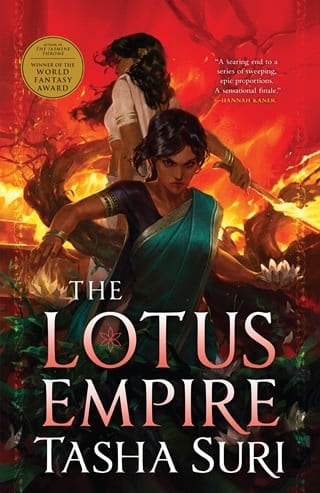Chapter 45 Malini
MALINI
She wanted only her most trusted people for this negotiation, but she couldn’t wait to summon Lata. She took her Parijati warriors and Rao’s forces along with her. She directed Lord Narayan and Low Prince Ashutosh to return to Parijat.
Lord Prakash she left in Srugna. He would counsel King Lakshan on her behalf.
The kai’s sister waited in an encampment on the road from Srugna. Rao had left her with a significant number of his men, guarded in her own tent. She bowed immediately when Malini entered.
“Lady Qutlugh,” Malini greeted. “Please. Stand.”
She raised her head. Qutlugh was fairer skinned than Malini, with thick black hair bound in a braid. She wore the kind of clothes typical of Dwarali, with its bitterly cold winters and mild summers: a salwar kameez and jacket and shawl, thick fur-lined boots. On her wrists, ears, and throat she wore heavy golden jewelry, and her eyes were lined with kohl.
“Prince Rao has told me what your brother and your people desire,” Malini said, without pleasantries. “I’d like to hear it from you.”
“We desire a home, Empress,” Qutlugh said. Her accent was thick, musical—but she knew court Dvipan, the language of the empire’s highborn, and wielded it now instead of the common Zaban that Malini had used. Her choice of language said, I am highborn. I was born to power, just like you. “Land that is ours. In return, we offer heart’s shell.”
“You will give us the location of the mine?”
Qutlugh shook her head.
“The location is secret,” Qutlugh said. “Only a few members of my family line possess the knowledge. I am not one of them.” A dimpling smile. “We will bring the heart’s shell to you whenever you command it, of course.”
“It will be inconvenient for your family to cross the Lal Qila regularly,” Malini observed. “Especially if your new home is deep within the empire. And we will need a great deal of this stone. Our empire is at war.”
“We will make the journey gladly, as many times as Parijatdvipa requires it of us,” said the kai’s sister. “But we will not part with our knowledge. My clan recognize that we have been weakened. My brother lost our lands when he was a young ruler, and we have limited military power. But we have the heart’s shell. Our knowledge is our greatest resource, and we will not squander it.”
Malini inclined her head.
“Will you vow your obedience to Parijatdvipa, and to the descendant of Divyanshi who holds the Parijatdvipan imperial throne?”
“Will you refuse us if the Jagatay do not? If we will not vow, will you reject us?” Qutlugh raised an inquisitive eyebrow. “If we have no home from you, Empress, you will have no heart’s shell from us.
“You have threatened nothing,” Qutlugh continued, “but I will tell you this anyway, because I understand the nature of those who rule: My brother will not bow or bend if you hold me hostage or kill me. I came here as any warrior going to battle. I knew I risked my honor and my life. If you torture me, I have no knowledge I can share that will lead you to heart’s shell. But I am willing and able to bargain with you, Empress.”
“I can offer nothing without a vow of loyalty,” Malini said.
“Ahiranya was part of your empire once. They made no such vows.”
“Ahiranya was a conquered nation. Do you wish your people to be treated similarly? Lady Qutlugh—this vow I ask for does not chain you. It makes your people equals among equals.”
“Equals beneath your throne, yes.” The woman tapped her lip thoughtfully. “A vow can be a hollow thing, Empress. You know this, don’t you? If I choose to lie, the vow of the Jagatay will be worth nothing. How can you trust me? How can we trust you?”
“My throne, my empire, rests on the vows of the kings who serve me,” Malini said steadily. “Betraying those vows would betray myself. As for my trust in you… Lady Qutlugh, you and your brother have given me a weapon that may save my people.” She filled her voice with feeling—let emotion flit, for a moment, across her features. “How can I not extend you trust?”
Qutlugh gave her a long look. Then, finally, she nodded.
“We may bargain, Empress. You will need heart’s shell urgently, I think.”
“You’re correct.”
“I carried a supply of heart’s shell with me,” said Qutlugh. She touched a light hand to the heavy gold at her throat, then swept the hand up to the large earrings strung through her ears, bound with chains to her hair to ease the burden of their weight. She met Malini’s eyes with a smile. “Heart’s shell painted with gold,” she said. “I guessed it would go unnoticed.”
Clever.
She removed her bangles—heavy links of stone bound together and placed them each into Malini’s waiting hands.
Malini looked at them. She felt their weight and thought of how easily the strings that had bound them to Qutlugh’s wrists could be crafted into locks. Something to hold a yaksa’s powers at bay, and a human woman’s hands chained.
“Come,” said Malini. “My guards will bring us food and drink. We have negotiations to conduct.”
When negotiations came to an end, Rao departed. Half his men would take Lady Qutlugh to Dwarali and arrange her safe passage beyond the Lal Qila. The rest would have to travel with him.
He left at dusk, gold light grasping his shadow as he rode away from her camp. He’d bowed when he’d said goodbye to Malini. To Sima, who would remain with Malini, he gave a soft farewell, his eyes huge with apology.
Sima gave him a stiff farewell in return. She was clearly upset at being left behind. But she watched his departure for just as long as Malini did, her eyes fixed on the distance, arms crossed protectively over her body.
“Take care of her,” Malini said quietly to Sahar. “Make sure she causes no trouble.”
Sahar inclined her head in understanding.
A rider with a message arrived hours later, kicking up dust under his horse’s hooves. His face was sickly under his helm; his hands shook when he drank the water that was carried to him.
“Soon after you left, Empress,” he said, in a grim voice held steady by stubbornness alone, “something unnatural pierced Srugna. A quake shook the earth. And the rot… the rot spread in the blink of an eye. And something in the forest, among the trees, killed hundreds of soldiers. It took less than an hour, Empress, for the devastation to spread.” He bowed his head. “Lord Prakash begs more aid on behalf of King Lakshan. More soldiers. Food supplies. Anything that can be spared.”
“There are no swords I can offer that will be able to fight the rot,” Malini said finally, once her horror had settled. “But I will send a message with you ahead of my retinue to Parijat. Our stored harvest will be shared with Srugna, and the priests of the mothers—and I—will pray for Srugna’s dead.”
She left the audience tent.
She paused, one breath, one heartbeat. That was all it took for her to see what lay around her, and how the landscape had changed:
The leaves of the fronded plants surrounding the tent had all turned toward her.
She could not save Srugna from the rot. But there was something else she could do.
She could dream.
When Malini returned to her tent, shaking and strange, she smelled something sweet on the air. Something like green things after the first flush of monsoon rains. No incense had been lit, and Swati had left no flowers in bowls of water to fragrance the room. The scent was a beckoning, a call.
Priya.
You knew I would come for you after all , Malini thought. How could I not, after what you have done?
Malini did not sleep. For some reason, she knew she didn’t need to. She remembered the way Priya had reached for her magic at times; the closed eyes, the slow deep breaths. She kneeled on the ground, on the softness of a rug over tent canvas, and closed her own eyes.
Inside her skull lay a door. The distant sound of rushing water.
She stepped through it.
She was not in the imperial court. She was in a shadowy place where leaves rustled and insects whined, a place where Priya kneeled in front of a vast lake, black in a dreamlike darkness beyond day or night.
The lake was covered in a thick carpet of blue lotus flowers.
“They’re beautiful, aren’t they?” Priya said. She turned her head and met Malini’s gaze. “I’ve never seen anything like them. But I will soon.”
Malini walked toward her. There was still distance between. Too much to cross with hands, touch. Malini kneeled down, soft grass beneath her.
“You killed people you once claimed as your allies,” Malini said. “People who were your friends.”
Priya flinched. She turned back to the water.
“I could have died because of you, Malini,” Priya said. “That weapon you have could have killed me.”
“I ordered them to capture you alive.”
“You can tell a man what to do with a weapon,” Priya said. “That doesn’t mean he’ll obey. You know that.” Her shoulders bowed forward a little. “They should have killed me before I could kill them. Why didn’t you tell them to?”
Malini’s heart thundered in her chest, a roar in her ears.
“You know why,” she said. She didn’t know what emotion seeped into her voice. Only that it made Priya’s hands curl against the ground and her head tilt forward, as if she could shelter herself from it.
“What would you do if you could see me again, Malini? Touch me?” The water rippled. The blue lotuses glowed. “Would you kill me? Imprison me?”
Malini said nothing. If she spoke, she would say something she did not want to—something that revealed her rotten, wanting heart.
“I think we should find out,” said Priya.
Malini returned to her body with a gasp.
She knew of those lotuses. She’d studied the geography of Parijatdvipa, marked on maps of war and maps of famine, in the course of her rise to the throne.
Utpala Lake. Alor. That was where Priya would be.
 Fullepub
Fullepub 



